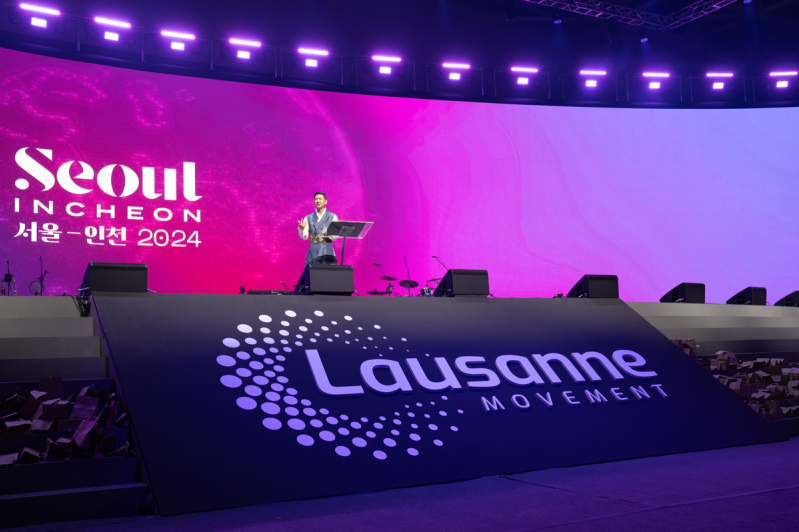
The Fourth Lausanne Congress on World Evangelization came to a close on Saturday, Sept 28, with Global Executive Director Dr. Michael Oh calling on all believers to participate in the Great Commission. The week-long event that brought together nearly 5,400 participants in Incheon, Korea and almost the same number online sought to address some of the key gaps in missions today, with a major emphasis on the role of believers in the workplace and the need for collaboration.
The closing session returned to the Congress theme Let the Church declare and display Christ together as Oh highlighted once again the importance of Christians working together rather than isolating themselves and focusing only on their own lives and initiatives.
“Now what's missing when we simply try to declare and display Christ alone, when there's no ‘together’? Is it wrong to say that I just want to do my own thing in my own place as faithfully as I can?” he asked.
“That might be fine if Christ's last words to the disciples were to stay where you are, just focus on your own people, invest in your own activities, your own plans, your own goals. Don't concern yourself with the big picture,” he commented, adding that this is not what Scripture says. “Instead, Christ said, go and make disciples of all nations.”
He cautioned that it is easy for individual Christians to dismiss the Great Commission as “not my business”, when in fact it is “everyone’s business and responsibility”, Oh said. He warned that this widespread attitude has led to a trajectory where every year, there are more people in the world who have never heard the gospel than the year before.
He pointed to many Muslims, Buddhists and Hindus who do not know a single Christian, but then added that they are not spending all day only in mosques and temples, they are also working in banks, tech companies, law firms and factories, or study at universities in their home countries or abroad. Therefore, sharing the gospel with these people is “not just the responsibility of missionaries and ministers, but of artists, engineers, students, professors, CFOs, CEOs and more.”
He acknowledged that there is still a need to send Christians to many unreached places, he highlighted that they must be sent to various spheres of society.
“If you believe that the Great Commission was given to the Church and that you are a part of the Church and that the Holy Spirit has gifted you for the work of ministry and blessed you with time, talents and treasure to be stewarded for God's glory and contributed for the Great Commission, what could it look like for you to be fully invested in collective responsibility?” he asked.
He wondered what impact and effectiveness there could be if God’s people would look less like a Christian version of doing random acts of kindness and more like a coordinated and healthy body of Christ.
“What if every Christian, every church, every Christian business, every Christian family, every Christian school felt collective responsibility for every person in the world hearing the gospel, for there to be healthy disciple making churches among every people group, or resources to be stewarded and generously shared, and for compassion to be poured out to orphans, widows, aliens, and the poor, especially those without the gospel?” Oh asked, adding: “What if instead of ‘I don't need you’, we said to one another, ‘I need you’?”
Although individual Christians may feel like they are only a tiny part, he said that taken together, God can do “amazing things through us.”
He said that the collaborative action groups that met on four afternoons during the week sought to tackle some of the greatest challenges and opportunities for gospel engagement in the world today.
“You've been looking at critical data. You've been assessing current and future efforts. You've been transparent about failures and inefficiencies. You've listened to each other. You've prayed for spiritual wisdom and power. You've begun plans for faithful and effective stewardship and collaboration that will go on after the Congress,” he said and then pointed to Lausanne’s One Action Hub that is being developed as a digital ecosystem for collaboration.
21st century tools are needed for the 21st century world, according to Oh, who said, “We're excited to give to the global Church digital resources that will provide you a digital space for you to take collective responsibility and organize collaborative action.”
It will feature global data, such as the report on the State of the Great Commission that Lausanne published earlier this year. It will also be empowered by intelligent recommendation engines “to inform and inspire and support your strategic action to connect the best of what is known and needed to the best of who you are and what you have been given.”
Oh concluded by calling on participants to consider the Congress theme not merely as a theme but rather as an “anthem, plea and rallying cry.”
“So, rise up people, rise up beautiful body of Christ, rise up together. Rise up humbly, rise up with courage and go forth with intentionality, with collective responsibility, with beauty and with effectiveness to every nation, to every sphere of society, and to every generation that the Church declare and display Christ together. Amen, amen, amen.”





